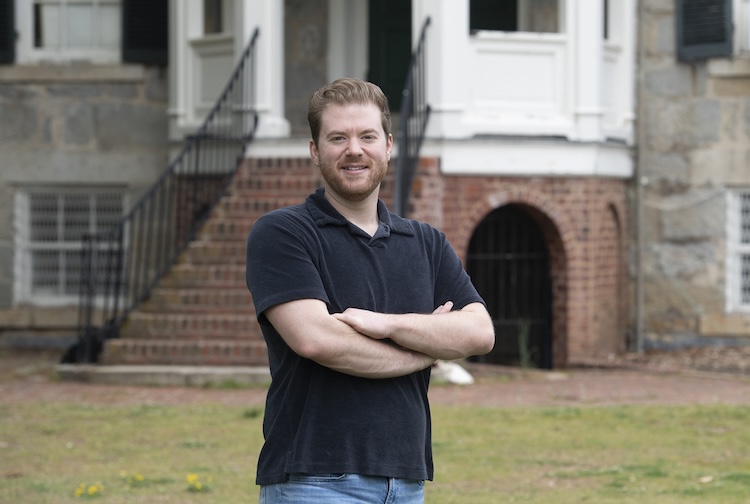
Inspired by his own journey, VCU nursing student Aaron Wimer aims to make an impact in mental health care
With his second degree from VCU, he will join an evolving field as a psychiatric mental health nurse practitioner.
May 03, 2024
 Aaron Wimer, who earns his second degree from VCU this month, plans to pursue a career in psychiatric mental health nursing. (Thomas Kojcsich, Enterprise Marketing and Communications)
Aaron Wimer, who earns his second degree from VCU this month, plans to pursue a career in psychiatric mental health nursing. (Thomas Kojcsich, Enterprise Marketing and Communications)
By Caitlin Hanbury
When he walks across the graduation stage this month, Aaron Wimer will collect his second nursing degree from Virginia Commonwealth University. His journey from pre-med student to psychiatric mental health nurse practitioner reflects a dynamic path shaped by personal growth, professional passion and new opportunities in his field.
Wimer earned an undergraduate degree in biology at James Madison University and planned to pursue medical school. But guidance from a trusted source steered him toward nursing.
“My mother recommended nursing, and I wisely took her advice and applied to VCU’s accelerated nursing program,” he said.
Wimer earned his bachelor’s degree from VCU School of Nursing in 2016 and joined VCU Health as a registered nurse in the cardiothoracic step-down unit. But he wanted to go back to school and become a nurse practitioner. Pursuing a graduate degree in psychiatric mental health nursing grew out of his own mental health journey and the realization he had valuable personal contributions to make as a health care provider.
Like many of VCU’s adult learner students, over one-third of whom are in the School of Nursing, Wimer charted an academic path that merged a natural progression of interests with a program supporting career ambitions.
“I believe what drew me to this degree was witnessing how putting my own mental health first exponentially improved my life,” he said. “Around the same time, I became interested in holistic care, and I stumbled upon a podcast whose guest was a psychiatrist that practiced functional medicine. That’s when I realized that psychiatry was evolving, was so much more dynamic and interesting than I had once believed, and that there was space for me to plant my roots and bloom.”
Indeed, psychiatric mental health nursing has undergone a notable evolution in recent years, marked by a shift toward more holistic and patient-centered care. The field is increasingly incorporating evidence-based practices, such as cognitive-behavioral therapy and mindfulness techniques, which offer new avenues for specialization.
According to the American Psychiatric Nurses Association, the field’s registered nursing workforce represents the second-largest group of behavioral health professionals in the United States. Expanded insurance coverage for mental health services, new career opportunities and a higher demand for qualified providers to meet the diverse needs of individuals with mental health challenges are driving expansion in psychiatric nursing.
Preparing new graduates like Wimer for careers in mental health requires education and clinical experiences that cultivate both the expertise and practical abilities essential for effective caregiving. Working with patients to navigate the complexities of mental health challenges helps nurses solidify their understanding of how to deliver compassionate care.
“In my clinical with Central State Hospital, I saw the intersection of our legal system and the mental health system, and the consequences of those two systems mixing. Something happened in that environment, though, working with those patients – I rediscovered that confident nurse I used to be,” Wimer said.
“I stopped becoming so ‘clinical’ and forced, and just talked to the patients like regular people. It changed the way they interacted with me, and that’s when it all started to come together for me,” he said.
Through a variety of clinical settings, Wimer encountered more opportunities to apply and refine those skills, fostering confidence and resilience.
“I was blessed to have a very well-rounded clinical experience with a nice mix of inpatient and outpatient psychiatry,” he said. “I earned experience working in specialized fields like substance abuse when I had a rotation at VCU’s Motivate Clinic and also had brief experiences with VCU’s Foster Care Clinic and the Mobile Health and Wellness Program. I can confidently say that I feel I have a solid foundation.”
The nursing program also offered Wimer the chance to consider how broader social and systemic challenges, ranging from economic disparities to societal misconceptions, plague mental health care delivery – and how he, as a provider, could advocate for patients facing those obstacles.
“Anecdotally, I would say that the most pressing challenges are cost/income inequality (brand name medications generally cost more, newer therapies are often only accessible to those with money), a general lack of societal knowledge about the mind-body connection, and the lack of emphasis, funding and support on keeping those with mental illness stable and in the community to thrive as they deserve,” Wimer said.
Motivated by a commitment to holistic care and a vision for transforming mental health treatment, Wimer is drawn to emerging fields such as metabolic psychiatry and the deprescribing movement. His experience in the VCU program also fueled his aspiration to transform care delivery by blending innovative approaches with more traditional practices.
“My goal is to offer my patients something different, to provide them with options,” Wimer said. “I always enjoy hearing about new and exciting ways to treat mental illness or, better, prevent mental illness.”



